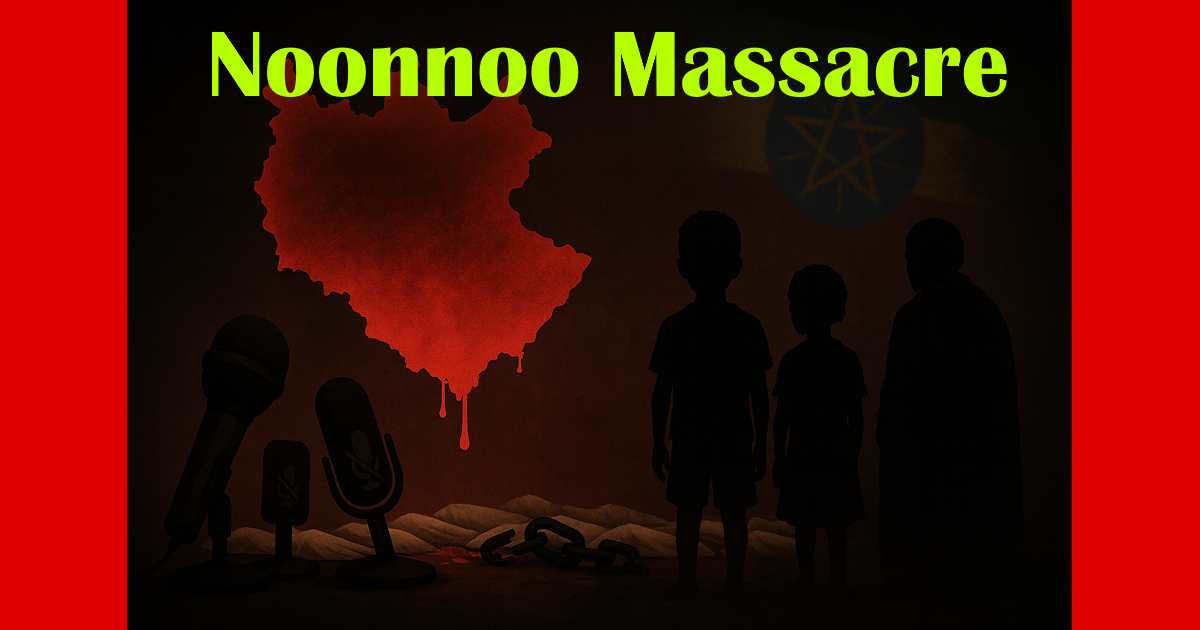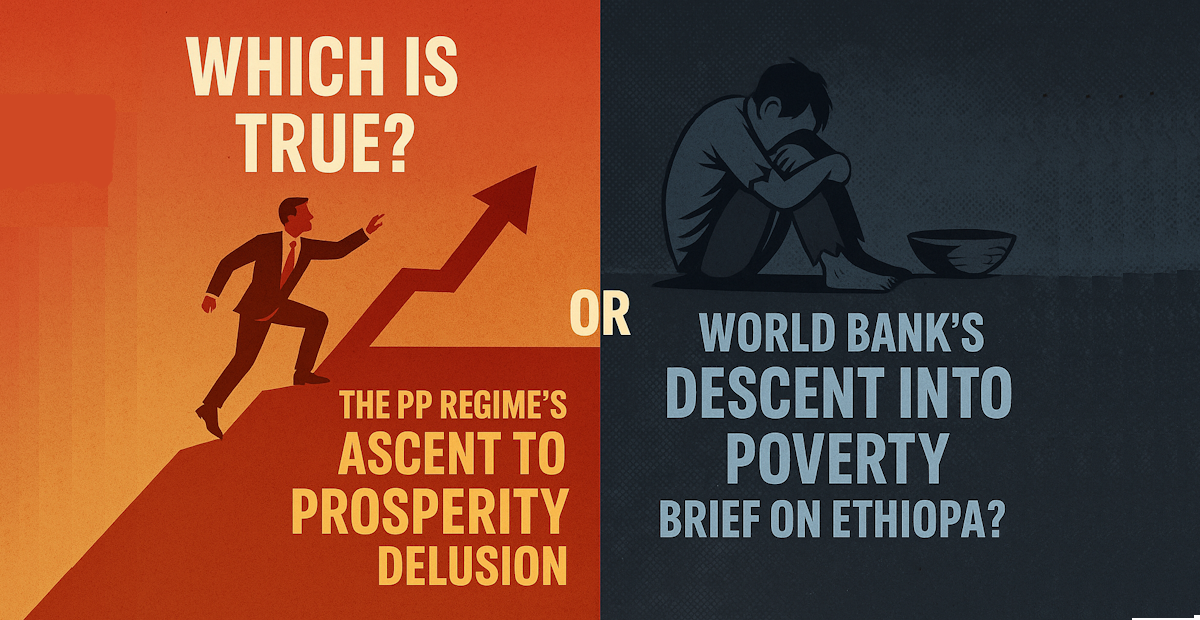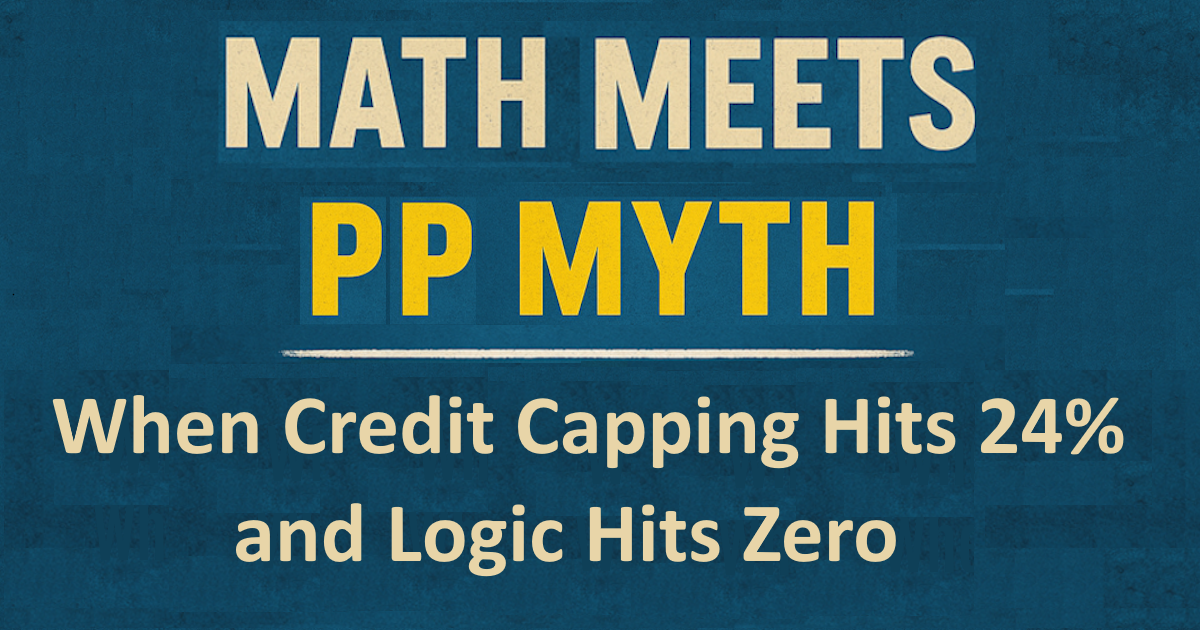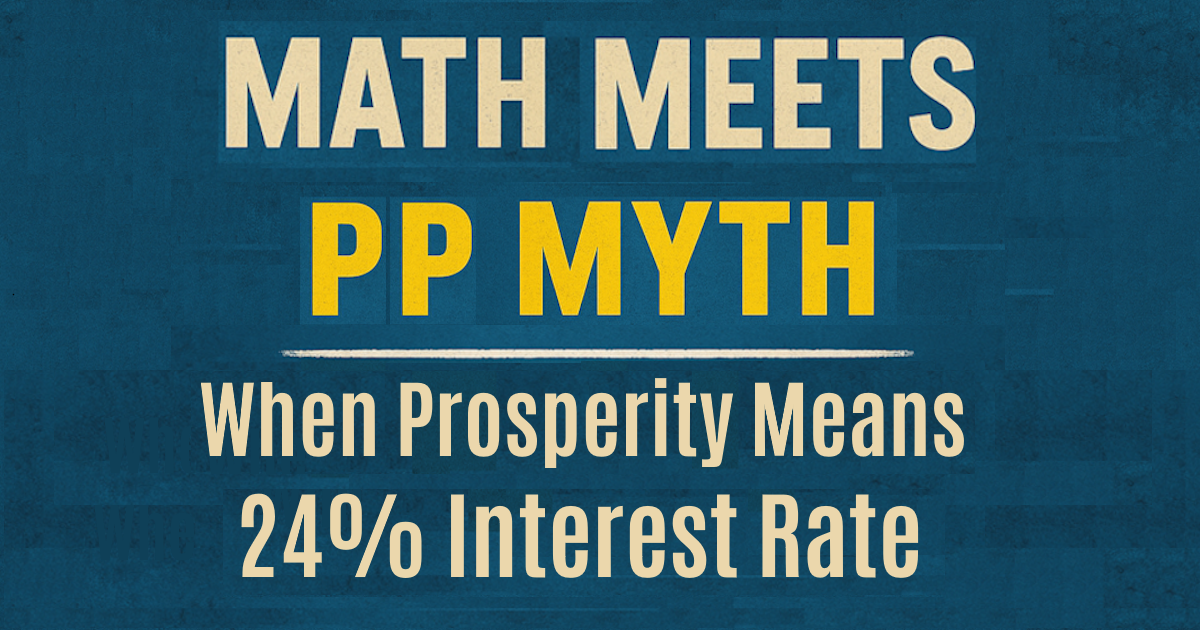Amorelite: An Illuminating Word We Didn't Know We Needed
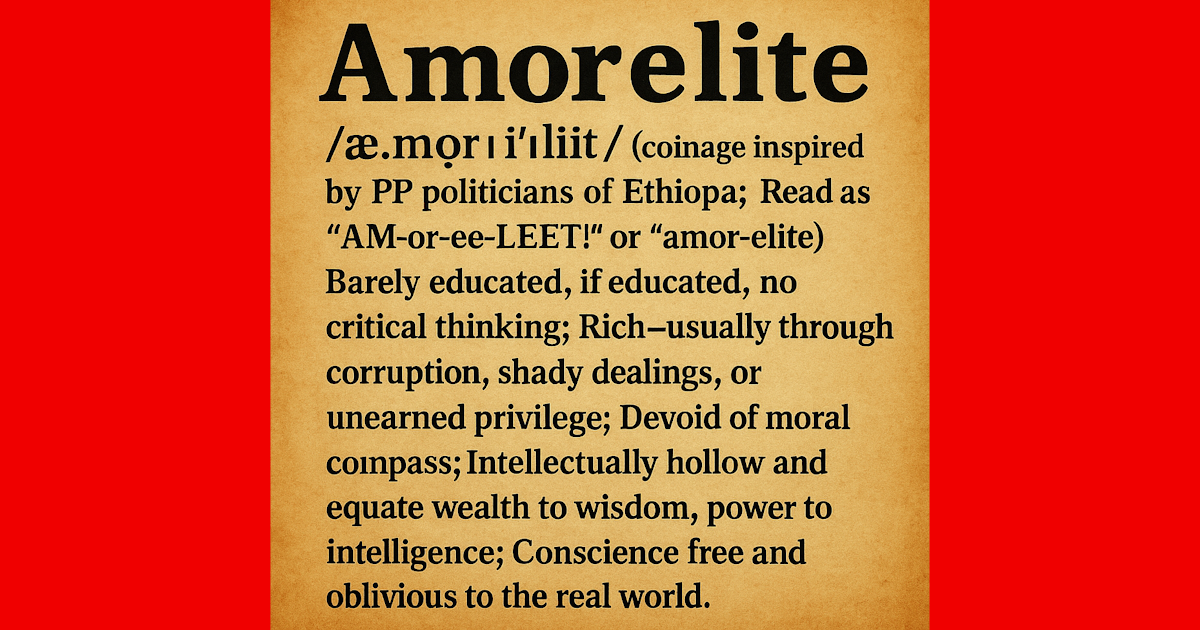
An Essay by Invitation
Excerpt
The rise of the Amorelite — a corrupt, conscience-free elite class — is not just a sign of decay in Ethiopia and Oromia; it is the disease itself. This essay names and frames the unspoken social affliction eating away at power, ethics, and humanity. Read it. Name it. Confront it.
Introduction
There are times you encounter a recurring human behavior so peculiar, so oddly persistent, that you pause and search your vocabulary — only to find nothing quite captures it. Take, for instance, a child in a candy shop: wide-eyed, gleeful, impulsive. You instantly recognize the joy, the innocence. No need for a philosophical framework. It’s a simple, delightful moment.
Now imagine an adult in the same setting, acting with similar abandon. That’s a little unsettling. But unless such behavior becomes a trend or pattern, it’s dismissed as an oddity — a personal quirk, perhaps the result of a sugar crash, a bad breakup, or both. But what if this kind of behavior — not just childlike, but thoughtless, out-of-place, unanchored — becomes prevalent? What if it starts defining an entire class of people who wield power, shape narratives, or control wealth? Now it becomes something worth diagnosing. And to diagnose, we need a word.
Let’s Try Amorelite
The type I’m describing doesn’t simply act foolishly. They are barely educated — sometimes only enough to dial a phone number or navigate a TikTok menu. They are entirely devoid of any moral grounding. Think amoral, not immoral.
Their wealth is typically accidental, ill-gotten, or inherited via nepotism or corruption. Their knowledge base is shallow, yet their confidence in it is sky-high. They mistake money for wisdom. They confuse power with intelligence. They live in a self-constructed mental fortress — a lala land untouched by the real rhythms of society, of ordinary life.
And so I coin the word: Amorelite — “amor-elite.” A fusion of amoral and elite. It rolls gently off the tongue but lands with weight. Yes, you may write it “amor-elite” to reflect that division and emphasis. It’s gentle phonetically — but philosophically, it hits hard.
Immorality vs. Amorality: A Vital Distinction
Let’s clear up a common confusion. Immorality and Amorality are not the same. An immoral person understands right and wrong but chooses wrong — often driven by desire, impulse, or self-interest. But crucially, they can feel guilt. They can be reasoned with, exposed, or corrected. They operate in a shared moral universe.
An amoral person, however, lacks that moral universe entirely. They’re indifferent to right or wrong. No guilt, no reflection, no compass. Cold, mechanical, and often systematic in their choices.
Think of a corrupt official: immoral. Think of an AI system deciding who to fire based on numbers alone, blind to human cost: amoral. As a metaphor: the immoral person is a villain. The amoral person is a machine without brakes.
Hannah Arendt’s “banality of evil” concept — Eichmann efficiently organizing genocide without passion or hatred — is the closest real-world example. Massive evil executed through thoughtless, conscience-free bureaucracy. That phrase again: conscience-free. That’s the very core of the Amorelite identity. I considered “unconscience” — a term not yet in the dictionary — but it didn’t resonate. I chose to stay anchored in the amoral root for precision and resonance.
What Defines the Amorelite Class?
Let’s compile the profile:
- Corrupt wealth
- Moral vacuum
- Intellectual emptiness
- Conscience-free conduct
- Obliviousness to surrounding realities
And this personality doesn’t operate in isolation. It flourishes in group settings. Political networks. Media circles. Government offices. Entire administrative systems. And yes, there’s a certain poetic justice in the name rhyming with “elite” — for these individuals often see themselves as elite. But they are far from it.
Where Are the Amorelites?
They are everywhere power flows without scrutiny. Start with the OPDO. With few exceptions (those who escaped early and often live in exile), the party’s structure was an Amorelite breeding ground. When OPDO rebranded itself and was subsumed into the Ethiopia-wide Prosperity Party (PP), with members donning a unitary cloak and discarding their regional badges, the mutation was complete.
Most members of PP across Ethiopia are textbook Amorelites. Their indoctrination gives them the appearance of a single pedigree—uniform in thought, speech, and impulse. It’s as if they were trained to think alike, with corruption practically part of the curriculum.
Take the Sidama regional president, now trending for an unimaginable corruption scandal. Or the Amhara PP cadres who willingly serve as lapdogs for the PP chief. These are not outliers. They are standard features.
But being an Amorelite is not limited to holding a party card. It is a mindset. The PP appear to be setting the behavioral standard—one that others are increasingly eager to emulate. Money and power, in such a moral vacuum, becomes a tool of personal gratification on display.
Some Everyday Examples
-
That TikToker, Mensur Jamal, who parades grossly unethical charity and shamelessness without a flicker of moral self-awareness? Amorelite.
-
The man filmed having his beard washed in a pint of milk, in a country where many children don’t even get enough milk to grow properly? Amorelite. Even if a medical reason existed (spoiler: it doesn’t), the public performance is tone-deaf.
-
The influencer who displays a lunch feast meant for twelve, while the majority barely survive? That’s not just indulgence — it’s Amorelite theatre.
- And there are top-tier ones!
Top-Tier Amorelites
These are mainly the public servants who somehow become millionaires and billionaires on a modest salary. Connected businesspeople too! Their lives are defined by extravagance, not philanthropy. They trade comparisons on everything from food preferences and liquor brands to wedding budgets, overseas schools for their children, and tips on securing foreign currency—topics far removed from their actual duties in public service or business management.
And all the while, the poor are rounded up for forced conscription, often underage, cannon fodder for political survival. Twelve-year-olds in uniforms they can barely carry. And the Amorelites? Not a care in the world.
Their children are on the campuses of Western universities—in Europe, North America, and the Middle East—often enrolled in American or British institutions. Yes, even Chinese campuses are part of the list. Meanwhile, the children of poor families are not found in schoolyards or college halls; they are on the battlefield.
Through what is currently trending on TikTok, we are witnessing a sickeningly extravagant wedding, where close to half a billion Birr has reportedly been squandered. Make no mistake: the intent here is not to police how individuals choose to spend their wealth. However, there are moments when collective moral judgment becomes not only inevitable but necessary—especially in a country where, without any exaggeration, thousands, if not millions, go to bed each night on an empty stomach.
What makes this even more disturbing is the emerging revelation that several military generals and regional presidents have already amassed wealth in the millions—if not billions—of Birr. This raises an unavoidable and troubling question: how do civil servants and military officers, whose official monthly salaries are typically below 20,000 Birr—barely enough to sustain a modest lifestyle—become so fabulously wealthy?
The answer is as glaring as it is grim: corruption. Rampant looting of the country’s natural resources—particularly its precious metals and minerals—along with monopolistic control over lucrative business transactions and backdoor dealings. These individuals are not enriching themselves by fulfilling their official duties, but by following the scent of money wherever it flows, often at the expense the public revenue.
The Aspirations of the Amorelite
Beyond prestige weddings and showy consumption, the crown jewel of the Amorelite fantasy is a home in the West. America. Europe. Yes, Dubai also on the list. A getaway plan in case it all collapses. They dream of being global elites, yet they possess no intellectual or ethical tools to integrate. They do not understand philanthropy, innovation, or the quiet dignity of service. They only understand display. Their imagination never stretched beyond status.
And because many of them come from impoverished backgrounds, they lack an internal compass for using wealth—especially wealth acquired through dubious means—in any meaningful way. Instead, they squander millions on empty displays, as if extravagance alone proves they’ve made it. It’s not that they’re unwilling to do good — they are incapable. That’s what makes them Amorelites.
Are Amorelites Educated?
In theory, most yes, but some barely made to middle school. In practice, no. Education, as understood in Ethiopia today, is more often academic indoctrination than intellectual awakening. Critical thinking is replaced with conformity. Gone are the days when Ethiopia’s few higher education institutions could genuinely compete with their Western counterparts. Once symbols of academic promise, they now struggle to retain that stature amid growing quantity but declining quality.
The EPRDF, during their nearly three-decade reign, established close to 40 public universities, alongside a proliferation of private colleges and universities. Given that Ethiopia is the second most populous country on the continent, it undoubtedly needs even more institutions of higher learning. However, without adequate funding and rigorous quality control, the mere increase in numbers does little to serve the nation’s educational or developmental needs.
This reality is unlikely to change any time soon, especially with super Amorelites like ‘Professor’ Birhanu Nega presiding over the nation’s education system—where learning has been reduced to a mechanized process of credential distribution rather than a pursuit of intellectual enlightenment. Under his stewardship, education appears stripped of its transformative purpose, hollowed out into a bureaucratic exercise in certification. In fact, Birhanu Nega might well qualify for a Guinness World Record for engineering one of the lowest entrance pass rates into higher education in modern history—reportedly around 3%. Such staggering figures, almost surreal in nature, are the kind of tragic oddities that seem to occur only in Ethiopia.
The region most affected by this debacle is Oromia. Remember Birhanu Nega—by his own admission, he entered politics to halt the liberation of Oromia. Today, he is enacting a near-exact replica of what his historical counterpart, Ato Tedla Haile, began in 1933, albeit with a modern twist: the systematic elimination of Oromia’s generationally skilled workforce.
So, we get educated illiterates, or what some call functional illiterates — people who can read, write, and defend their diploma, but cannot think. Call it “credentialed ignorance” or “schooled stupidity.” These are diplomas without depth. Education without ethos.
If an Amorelite is educated to higher education, their education sharpens only the knife, not the conscience. The knife they use on raw meat. Yes, the very raw meat they so proudly and excessively display at extravagant weddings, symbolic gatherings, and any inaugural event they can invent just to justify another feast.
For them, these moments are less about celebration and more about spectacle—a theatrical exhibition of indulgence, where excess is mistaken for status and raw flesh becomes a bizarre token of power.
No Principles, No Backbone.
The Amorelite wears any hat that suits the moment. They drift with the wind. Their soul is unanchored. They have no sense of responsibility, no ethical spine, no grounding in principle.
Oblivious—or indifferent—to the truth (and remember, they simply don’t care to know), they go so far as to praise a figure who butchered their not-so-distant ancestors. If praising Menelik boosts their popularity in certain quarters, it’s no problem at all. For Amorelites, the architects of Oromo identity erasure, forced assimilation, and large-scale massacres are the most celebrated heroes.
They portray Ethiopia as something it never was, retrofitting it into a selectively crafted Abyssinian narrative—dubious in its own right. The Amorelites’ version of Ethiopia is even louder than that of those seeking to resurrect the old imperial system, as if to outdo them in zeal.
In fact, the Oromia Amorelites have lost the plot entirely by becoming more Ethiopianist than the unitarist-anti federalist bunch. What an astonishing inversion of logic, considering these very people rose to power on the back of Oromo Resistance—a struggle that cost the lives of over 5,000 Qeerroo and Qarree youth.
The Most Dangerous Amorelites: Those in Power
When Amorelites rise to positions of authority, the outcome is catastrophic. They do not care about justice, duty, public trust, or posterity. They violate every moral standard. Their only mission is staying in power. Western politicians, at least nominally, worry about their legacy. Some even worry about how history will judge their descendants. Amorelites? Not even a flicker of such concern. Their conscience is a blank page.
Take the Koree Nageenyaa whose atrocities were revealed by Reuters’ reporting — the supposed peace council of Oromia only by name. Its sole mission is to ensure Oromia remains a 100% PP constituency. That’s it. Not reconciliation. Not good governance. Not reform.
The war against the OLA isn’t driven by ideology, nor is it grounded in legality or constitutional principles. At its core, it is about maintaining a political grip on a region that is perceived to be slipping away. That alone should explain why, from the standpoint of the Amorelite-led government, any negotiation is framed as ‘full surrender or nothing.’ They are not interested in dialogue or mutual concession—because true negotiation implies compromise, and compromise, in their view, means relinquishing control. More than Prime Minister Abiy himself, it was President Shimelis who proved especially adamant in undermining the negotiation process. His resistance was not incidental; his very position as regional president stood at greater risk from any concession than Abiy’s at the federal level.
For Shimelis, compromise represented political suicide—and thus, negotiation became merely a tool to delay, discredit, or dismantle rather than resolve. It is, in plain terms, an Amorelites’ war for political survival. If that means millions die, then so be it. If pitting Amharas against Oromos gives them more time in office, green light it. Let no one mistake this: Oromia and Ethiopia are largely ruled by Amorelites.
And Then there is the Damorelite
Let us not forget the Diaspora version: Diaspora + Amoralite = Damorelite (pronounced damor-elite).
These are foreign-based collaborators, often seduced by offers of land and prestige in the name of investment. They lend legitimacy to corruption and serve as its international PR agents. They have been swept away by the same self-serving incentives — and more on them is coming in the next installment.
Final Thought: Why It Matters to Name This
When something so destructive becomes common, it becomes invisible. Language makes it visible again. Amorelite is a word that lets us see the rot in sharp focus. It’s not just about corruption. It’s about a dangerous fusion of ignorance, power, corruption, and conscience-free behavior. By naming it, we begin to confront it. Let this be the beginning of a deeper philosophical journey — a diagnostic tool for Oromia, Ethiopia, and beyond.
Finally, is there an opposite of the Amorelite? Most probably. All we need to do is flip over the criteria we’ve laid out for the Amorelite and examine the reverse. And when we do, we begin to recognize them—not as abstractions, but as real individuals among us.
They are not loud. They are not showy. They live quietly, humbly, and with integrity. Their intellect runs deep, often understated, yet immediately felt by those who cross their path. They resist the temptations of corruption, choosing instead to live within their means. Therefore, their homes are typically modest—rarely exceeding two to three bedrooms on a single ground floor—eschewing the ostentatious multi-storey residences of those driven by excess and vanity. They serve without self-glorification.
These individuals command the highest respect in society—not through power or wealth, but through their unwavering honesty and inner dignity. And unlike the Amorelites, we don’t need to coin a special term for them. Because they are, quite simply, what humanity is meant to be.
Related References
- Editorial, Haile Selassie’s Chilling Assimilation Blueprint of 1933 for the Oromo: When ‘Unity’ Meant Erasure, April 25, 2025, OROMIA TODAY.
- Kumaa Daadhii, Ten Things the PP Government Has Done—and You Might Not Even Know, January 25. 2025, OROMIA TODAY.
- Giulia Paravicini, In Ethiopia, a secret committee orders killings and arrests to crush rebels, Filed February 23, 2024, 11 a.m. GMT, Reuters (https://www.reuters.com).
- Hannah Arendt, Wikipedia.
Endnotes
Hannah Arendt’s works cover a broad range of topics, but she is best known for those dealing with the nature of wealth, power, and evil, as well as politics, direct democracy, authority, tradition, and totalitarianism. She is also remembered for the controversy surrounding the trial of Adolf Eichmann, for her attempt to explain how ordinary people become actors in totalitarian systems, which was considered by some an apologia, and for the phrase “the banality of evil”.
— Courtesy of Wikipedia.


